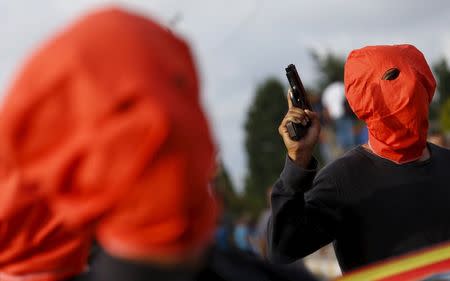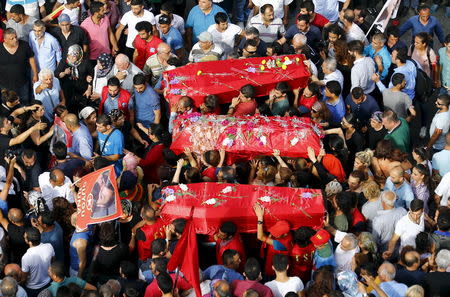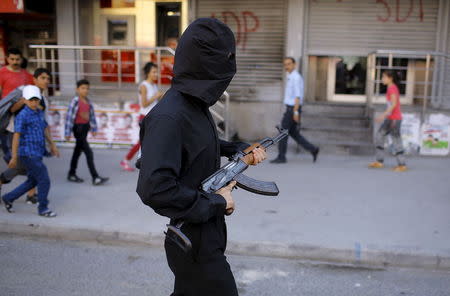Kurd militants say kill two Turkish police to avenge Islamic State bombing
By Orhan Coskun and Dasha Afanasieva ANKARA (Reuters) - Kurdish militants claimed responsibility for the killing of two Turkish police officers on Wednesday in what they said was retaliation for a suspected Islamic State suicide bombing which killed 32 mostly young students. The Kurdistan Workers Party (PKK) said in a statement on one of its websites that the two police officers were killed at around 6 a.m. in the southeastern town of Ceylanpinar for "collaboration with the Daesh (Islamic State) gangs". Security sources earlier told Reuters the officers were found dead with bullet wounds to the head in the house they shared in Ceylanpinar, on the border with Syria about 160 km (100 miles) east of Suruc, the site of Monday's suicide bombing. Many of Turkey's Kurds and opposition supporters suspect President Tayyip Erdogan and the ruling AK Party of covertly backing Islamic State against Kurdish fighters in Syria, something the government has repeatedly denied. Anti-government protests after Monday's bombing in Suruc erupted in several cities for a second night on Tuesday, with some of the demonstrators chanting "Murderer Islamic State, collaborator Erdogan and AKP". "Although Islamic State has been held responsible for this attack, Turkey’s AKP government, by resisting the taking of effective measures to prevent Islamic State and other reactionary forces, bears the real responsibility," the opposition Peoples' Democratic Party (HDP), whose support base is mostly Kurdish, said in a statement. Turkey's NATO allies have expressed concern about control of its border with Syria which in parts runs directly parallel with territory controlled by Islamic State. The prospect of conflict spilling onto Turkish soil, embroiling Kurds, Islamist militants and security forces will raise alarm inside and outside Turkey. Speaking during a break from a cabinet meeting attended by the commander of Turkey's ground forces on Wednesday, Deputy Prime Minister and government spokesman Bulent Arinc told reporters border security would be tightened. "What is important in the face of Deash (Islamic State) is to block the terrorists' transit points and to have physical obstacles to this. A physical security system will be established at the border," he said, without giving details. SUSPECT HAD TRAVELLED TO SYRIA A senior Turkish official told Reuters there was "strong evidence" to suggest the bomber was a 20-year old man born in the southeastern province of Adiyaman and of Kurdish origin, who had travelled to Syria last year with the help of a group linked to Islamic State. "He was active in a Syria-linked group supporting the Islamic State. We know that he went to Syria illegally. It was not possible to track him during his time there," the official said, speaking on condition of anonymity because of the sensitivity of the investigation. He had links with another alleged bomber who attacked an HDP rally in the mostly Kurdish southeastern city of Diyarbakir days ahead of a June 7 parliamentary election, killing four people and wounding at least 200, the official said. The Radikal newspaper quoted what it said was the man's mother saying he was a former student at Adiyaman university who had worked as a painter with his 25-year-old brother before going abroad. "I don't know where he is now. I don't know if they joined ISIL (Islamic State), if they went for jihad," Semure Alagoz told the newspaper. They are both good kids, they wouldn't harm anyone." Two lawmakers from the HDP submitted separate parliamentary motions on Wednesday naming a 20-year old woman as a suspect, and asking why police had released her from custody last month. PROTESTS, MEDIA BANS The turmoil comes at a difficult time for Turkey, with a caretaker government in charge while the AKP seeks a junior coalition partner after losing its majority in the June election for the first time in more than a decade. At least 51 people have been arrested in protests in Istanbul alone and police seized more than 200 petrol bombs and a rifle, the governor's office in Turkey's biggest city said. There were also protests overnight in the capital Ankara, where demonstrators carried pictures of those killed in the Suruc attack as well as banners of the youth federation of which many of the victims were members. Anti-government groups have vowed further demonstrations and the HDP has called for supporters to converge in Istanbul for a mass rally this weekend. The prospect of further unrest has unnerved investors already worried by the uncertain political outlook. The lira was the worst performer among major emerging market currencies on Wednesday, falling more than one percent against the dollar, while Turkish stocks also fell. Access to Twitter was blocked for several hours after a court in Suruc ordered the removal of images of the blast and its aftermath. Facebook and YouTube avoided a ban after quickly complying with the court order, according to a statement from the Turkish union of internet access providers. (Additional reporting by Ayla Jean Yackley, Can Sezer and Daren Butler in Istanbul; Ece Toksabay and Mert Ozkan in Ankara, Seyhmus Cakan in Diyarbakir; Writing by Nick Tattersall; Editing by Ralph Boulton and Andrew Heavens)




